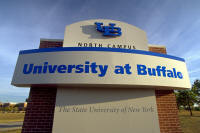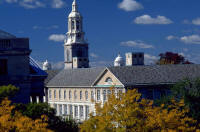Department of Social and Preventive Medicine
(State University of New York at Buffalo)
The Department of Social and Preventive Medicine in the School of Public Health and Health Professions at the State University of New York at Buffalo brings together faculty, graduate students and postdoctoral fellows with widely diverse backgrounds including epidemiology, medicine, nutrition, biological sciences and social sciences.
Faculty have research interests that include the epidemiology of cancer, cardiovascular diseases, diabetes, osteoporosis, urban health, women s health, clinical epidemiology, and infectious diseases. Included in this work is evaluation of factors such as nutrition, physical activity, stress, genetic factors and hormones in relation to risk of chronic diseases. The Department of Social and Preventive Medicine (SPM) has a strong record of research in chronic disease prevention and identification of risk factors and prevention strategies. Our research has high visibility in the community. The department has an active, well funded research program (averaging more than $3.5 million annually) Our graduate programs in epidemiology, including the Ph.D., M.S., and MPH programs, provide training in the understanding of the causation and prevention of disease and in the conduct and design of epidemiologic research. For more detailed information on these graduate programs, curriculum, and courses, please see our website: http: //www.buffalo.edu.
EPIDEMIOLOGY AND COMMUNITY HEALTH
The programs in epidemiology offered by the University of Buffalo (UB) Department of Social and Preventive Medicine benefit from a close collaborative association with other departments in the School of Public Health and Health Professions, with UB s medical and dental schools, with the Roswell Park Cancer Institute, a National Cancer Institute-designated comprehensive cancer center (http: //www.roswellpark.org/), and with other university departments.
The University at Buffalo, a large and comprehensive urban research university, has world-class facilities for graduate study in epidemiology including sophisticated computer and health sciences library facilities. The university s medical school offers courses in basic science and medicine and is affiliated with major hospitals in the Buffalo area. Graduate students have opportunities to observe and do research with other clinical and research faculty in the health sciences at UB. In addition, students can work with the local and state health departments. There are opportunities to work with federal health agencies including the National Centers for Disease Control and Prevention and other federal health agencies. Student research often focuses on health problems in the population in Western New York . However, students have also conducted research in other parts of New York State and in locations around the world including Italy, Puerto Rico and Brazil. More information on the academic programs at UB can be found at: http: //www.buffalo.edu.
Ph.D. in Epidemiology and Community Health
The doctoral program in epidemiology and community health, which has received a SUNY top quartile ranking, is designed for individuals wishing to achieve the highest degree of training in epidemiology.
The program curriculum offers a variety of courses in epidemiology and biostatistics as well as access to many other courses in fields such as biology, medicine, oncology, and geography. Other courses are available in advanced epidemiologic methodology, research methods, advanced biostatistical analytic methods, and the epidemiology and prevention of certain chronic diseases and conditions. The primary emphasis will be on advanced courses in various specialty fields within epidemiology, such as cardiovascular diseases, cancer, molecular epidemiology and nutritional epidemiology. Courses are also available in health care administration.
All degree candidates design and undertake significant original independent research reported in a doctoral dissertation.
A sample of dissertations that have been completed in the program includes The Relation of Serum Levels of Antioxidant Vitamins with Pulmonary Function in a Sample from the General Population,
Periodontal Disease as a Risk Factor for Cardiovascular Disease, Environmental Organochlorine Compounds and Thyroid Function in Western New York State Anglers and Sportsmen, Reducing Barriers to Smoking Cessation in a Medicaid Population: The Medicaid Stop Smoking Intervention Study (MEDASSIST), and Environmental Exposures in Early Life and the Risk of Breast Cancer.
The master s degree program in epidemiology is designed for individuals who wish to pursue advanced training in epidemiological research, clinical epidemiology, comprehensive health planning, program evaluation, and management of health and other human services systems.
Although all course requirements can be completed in one and one-half years, most students require additional time to complete the M.S. thesis. More information on the M.S. program is at http: //www.buffalo.edu.
M. P. H. in Epidemiology or Health Services Administration
The Master of Public Health (M.P.H.) program prepares students for public health careers by providing a comprehensive understanding of public health philosophy as well as the practical knowledge and skills needed to address current and emerging public health issues. The M.P.H. program is the professional degree program for health professionals with or without doctoral level degrees and for individuals who have substantial interest in a career in public health.
The MPH can be combined with other kinds of professional training, such as medicine (M.D./M.P.H.), law (J.D./M.P.H.), and business (M.B.A./M.P.H.).
The UB M.P.H. is a 49-credit-hour program that can be completed in four semesters of full time study. The program consists of a core curriculum, epidemiology or health services administration concentration electives, a public health field training experience, and an integrative project.
The core curriculum offers courses in epidemiology, biostatistics, health care organizations, the study of health behaviors, principles of public health, the biologic basis of public health, and environmental health. Other epidemiology courses include advanced epidemiologic methodology, research methods, advanced biostatistical analytic methods, and the epidemiology and prevention of certain chronic diseases and conditions. Other health services administration courses include program planning and evaluation, health policy, public health law, management for public health practitioners, managed health care, and strategic and operations management.
For detailed information on the program, please see the website:
http: //www.buffalo.edu
Graduates of the M.P.H. health services administration or epidemiology concentration work in organizations that deal with population health issues including local, state, and federal health departments and other national and international governmental agencies; managed care organizations and hospitals; industry, insurance companies, voluntary health organizations, and professional organizations. Others continue their education as medical students or residents in post-graduate residency programs.
General Preventive Medicine Residency Program
The Department of Social and Preventive in combination with several affiliated institutions, agencies and programs offers a broad-based, accredited two-year residency in general preventive medicine for physicians seeking specialized training in preventive medicine and public health.
In the first year of training, residents are expected to complete a course of graduate studies leading to an M.P.H. degree. The second year of training consists of supervised field experiences in a variety of preventive care settings including cancer prevention, preventive cardiology, and occupational health. Applicants should complete one year of approved clinical residency training before beginning our program.
The department offers a specialized training track in Cancer Prevention and Control within the residency program.
The department also offers a combined four-year Internal Medicine/General Preventive Medicine Residency Program for medical students. Applicants must be accepted by each of the component programs. The first two years of training in this four-year program are provided in the internal medicine residency program, followed by the two years of training in preventive medicine.
More detailed information on the UB General Preventive Medicine Residency Program can be found at http: //www.buffalo.edu.
The City of Buffalo
Everything you ever wanted to know about life, work, and play in the eight counties of Western New York can be found at the Western New York Information Center website: http: //buffalocvb.org/ and at the Buffalo Niagara Convention and Visitors Bureau website: http: //www.buffalocvb.org/ .
Information on visual arts, music, literary arts, theatre and dance, museums, and local history and art resources can be found at the Buffalo Free Net Arts and Cultural Activities Center website: http: //buffalocvb.org/
The city of Buffalo has many parks and Niagara Falls is nearby.
The locals are proud to call Buffalo the home of the original Buffalo chicken wings. The place to sample Buffalo Wings is at their birthplace, the world famous Anchor Bar (at http: //www.anchorbar.com)
CONTACT
Address:
State University of New York at Buffalo
Farber Hall, Rm. 270
3435 Main Street
Buffalo, New York 14214-8001
Telephone: (716) 829-2975
Fax: (716) 829-2979
Email:
General information mco@buffalo.edu
Graduate Studies Information: mwoppere@buffalo.edu
Website: phhp.buffalo.edu/spm/
| | 


|
CONTACT
Address:
State University of New York at Buffalo
Farber Hall, Rm. 270
3435 Main Street
Buffalo, New York 14214-8001
Telephone: (716) 829-2975
Fax: (716) 829-2979
Email:
General information mco@buffalo.edu
Graduate Studies Information: mwoppere@buffalo.edu
Website: phhp.buffalo.edu/spm/ | |



